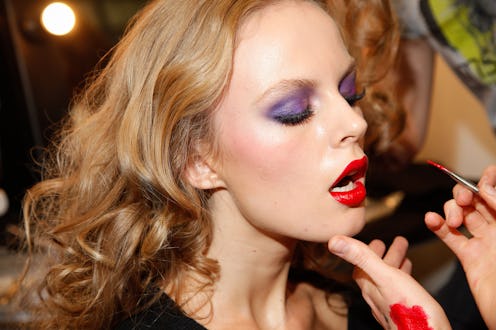Fashion
A Movember Movement For Women
The past month has seen a plethora of beauty-related controversies, from celebrity airbrushing and Instagram retouching to makeup mastery, and in protest of the trend, Christian association Rave Ministries wants us all to go back to basics. Rave, a religious group for young women, has announced their latest campaign, "No Makeup November," encouraging women everywhere to question why, exactly, they use cosmetics.
"No Makeup November" encourages women to ditch their makeup and go natural, at least for the next nine days. Despite overt religious motivation behind the group's initiative, there are other, less ecclesiastical reasons impelling Rave. According to the group's website, American women spend a staggering $12,000 annually on beauty-related goods. However, Rave was careful to emphasize that "No Makeup November" does not seek to topple the makeup industry or eradicate the practice altogether, saying:
This campaign is in no way an anti-makeup campaign, because let it be known that it is not the makeup we are battling. Instead, it is a culture we are trying to fight.
The initiative echoes similar proclamations by Lady Gaga and Milla Jovovich in recent months, which call attention to our culture's tendency to erase facial flaws and standardize unusual features. Rave claims that in makeup usage, the real problem occurs when women do not see beauty or value in their appearance, and attempt to mask their features due to a deficiency in self esteem. The organization said:
It is our hope that women everywhere can see themselves as a true masterpiece intricately and purposely woven together by the Creator of the Universe.
Whether or not you believe in an intelligent creator is actually irrelevant to the crux of the movement; the central issue is the prevalence of women who don't believe in their own beauty because of impossible, culturally-imposed beauty standards. So prevalent is the instinct to conform to a single standard of beauty that the process begins as early as elementary school, from the misery of braces in pursuit of the perfect smile, to the use of injectable chemicals to freeze a face into perpetual youth. Clearly, we have an obsession with a very specific ideal of beauty, but one which is ultimately unachievable as well as potentially unhealthy.
Rave's movement is making its debut at a particularly prime moment thanks to a handful of brave celebrities and cultural pundits who are encouraging the self-image to the forefront. Tina Fey, an authority on being a woman in a male-dominated world, paints a vivid and unsettling image of our culture's perfect woman in her book Bossypants. Fey determined that the paragon of beauty is, much like Jim Carrey's collage of magazine photos pasted together to look like his true love in The Truman Show , an amalgamation of traits which typically do not occur naturally in the same woman. Fey says:
Now every girl is supposed to have Caucasian blue eyes, full Spanish lips, a classic button nose, hairless Asian skin with a California tan, a Jamaican dance hall ass, long Swedish legs, small Japanese feet, the abs of a lesbian gym owner, the hips of a nine-year-old boy, the arms of Michelle Obama, and doll tits.
Quite the laundry list of expectations for the average woman. And how does one achieve this impossible ideal? If you go the non-surgical route and don't have a job which allows you to spend five hours a day at the gym, makeup offers a quick fix. As Rave reiterates, however, the issue is not with makeup itself, but with the culture which hails makeup as a solution to what is deemed ugly, as opposed to a form of empowerment meant to make the wearer more confident.
The beauty industry isn't all bad, though (which is good, since, you know, we're here on this Fashion & Beauty vertical). Legendary makeup artist Bobbi Brown offers a healthier solution to the trend towards uniformity: use makeup to highlight what is beautiful on each individual face instead of wielding it as a tool of conformity. Her books, including Bobbi Brown Teenage Beauty: Everything You Need to Look Pretty, Natural, Sexy, and Awesome, emphasize that everyone has a unique look, and should celebrate what separates them from others by using makeup to play up individuality.
However, Brown's approach is still not a universal attitude adopted by makeup industry and its major players, made all the more complicated by the recent prevalence of beauty tutorials designed to make the consumer look like a particular character or celebrity. Case in point, if you type "Angelina Jolie Makeup" into the YouTube search bar (or any major celebrity, for that matter), a shocking number of search results are presented, each featuring a makeup artist who becomes unrecognizable after contouring, plumping, plucking, and covering up their features.
What we can glean from both the No Makeup November campaign as well as the airbrush/retouch/makeover standard is that there are negative psychological ramifications behind these unrealistic beauty expectations. In other words, our culture tells women that we aren't good enough as-is.
Makeup can be an incredibly amusing and confidence-boosting practice, but when cosmetics take away all traces of someone's unique identity, it becomes an exercise in negativity. So instead of using makeup to cover up the negative and fix problem areas, try picking out your favorite features and accentuate the positive. As the wise Oscar Wilde once bluntly said, "Be yourself; everyone else is already taken".
